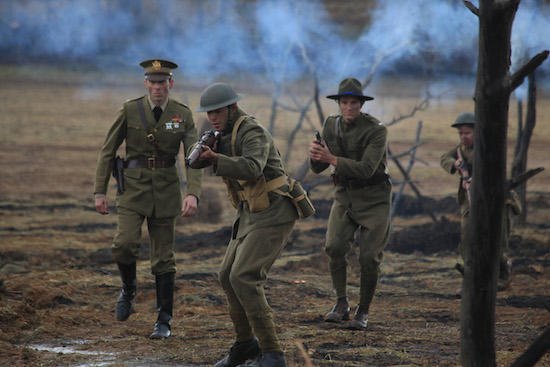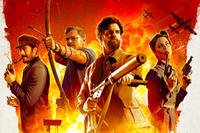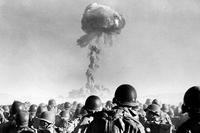
The History Channel's 4 1/2 documentary film The World Wars is out now on Blu-ray and DVD with a wealth of added in-depth profiles, documentary featurettes and deleted scenes. The series connects the two 2oth-century conflicts by focusing on the personal stories of key WWII players like Hitler, Churchill, Mussolini, Patton and FDR, asserting that it was their experiences during the Great War that influenced their decisions in the latter era.
The series uses extensive reenactment of events from World War I (along with some reenactments of WWII events) and has two actors play younger and older versions of its main characters. The approach is novel enough to keep the interest of viewers who've seen dozens of documentaries on the topic, but it's really a great starting point for anyone who doesn't know much about 20th century history.
Director John Ealer talked to Military.com about the series.

Tell us about the idea behind the World Wars? What are you doing different and what are you trying to accomplish?
One of the key ideas of World Wars was to look at the period of the early 20th century. Not as a period of two wars, of World War I and World War II, but instead to look at it as one giant geopolitical conflict. And what that gave us the opportunity to do was to see these legendary, almost titanic characters of the early 20th century, guys like Churchill, Hitler, Roosevelt, Stalin, and actually see how they became the men they were. So we would see how the decisions that they made in World War II were informed by what they experienced on the front lines of World War I.
%embed1%
There's a lot of reenactment in this presentation. As I was watching, I was thinking that the footage that we're used to seeing from World War II isn't available for World War I, that there's just not the same record of that conflict.
You're absolutely right. Obviously, World War II was an incredibly well-documented conflict and the armies on all sides recorded it in great detail on a lot of black and white and even color film, which is a very hardy medium and lasts a long time. It’s an amazing archival record of that period, both in terms of documentary footage that was practically shot by the military and also by propagandistic footage that was shot by all sides in order to promote their agenda.

When we conceived how to make the show, we knew that we were going to be able to tell a pretty big chunk of the story of World War II through the archival materials. World War I, on the other hand, there's not a great photographic record of it. Motion pictures barely existed and weren't really the same medium that they are today, so there's not a great filmic record of the conflict. We made the decision early on to shoot a lot of reenactments of World War I.
It also worked for us very well in terms of our character development, because as we talked about, we really looked at World War I as the formative influence on people like Hitler, Churchill and the like. Filming a lot of World War I reenactments really gave a chance for us to see how these characters were forged. We got to see how Hitler was gassed in the trenches. We got to see how Churchill turned the defeat of Gallipoli into a personal triumph by going back to the front lines.

Treating World War I and World War II as essentially one long conflict is a novel approach.
The events of World War I and World War II were cataclysmic and so very much shape the nature of our world. There's rightfully an almost endless fascination with the characters and the men and the women who led us during those periods. As documentarians and as television makers, we always want to try to find a new way to engage the audience with that history, to satisfy people who are knowledgeable about it while also attracting new people who may not know much about it at all. What we try to do is kind of give enough new stuff to excite people who know the story and not make it too complicated, so people who don’t know the story don’t feel overwhelmed.
I’s a fine balancing act. Overall, we did a pretty good job with this one. I think people can really feel like there's a lot of information in there without being overwhelmed by it. I hope, personally, that we're able to really excite people about the history and get people to keep reading more, learning more, going to blogs, going to sites like yours to help further the discussion, and so they can continue to inform themselves, because these periods are so important.

The film has a lot of star power from the modern commentators on the history. You don’t see John McCain and Stanley McChrystal and John Major or Colin Powell that often talking about the history the way they do in this documentary.
Stephen David, the executive producer of the show, was a visionary in terms of creating the genre. From the very beginning, he put a lot of emphasis on getting some of these high profile characters like Powell, like McCain, and in the end even President Obama, who introduced the show when it premiered over Memorial Day. When you’re trying to engage a modern audience, having characters and commentators that they can recognize really helps make it fresh for them and helps them see it with new eyes.

The History Channel gave you a lot of time to tell the story.
Well, it's terrifying. Six hours is a lot of television to fill. It's three feature films, if you add it all up. On the other hand, it's really a postage stamp of time, compared to the amount of stories and details that we could put in a show like this. We could have made the show six, ten, twenty times longer and still not run out of interesting details to put in.
One of the things that we all thought was really interesting was that Churchill and Hitler were both amateur painters. They were probably painting in the trenches at the same time, opposite each other. We really wanted to put that in, but there just wasn’t enough time to add that story. I give credit to the co-executive producer, Tim Kelly, and his team of editors, did an amazing job sorting out how to sew all these different feats together into kind of a cohesive whole, to really tell a singular story that people respond to.




